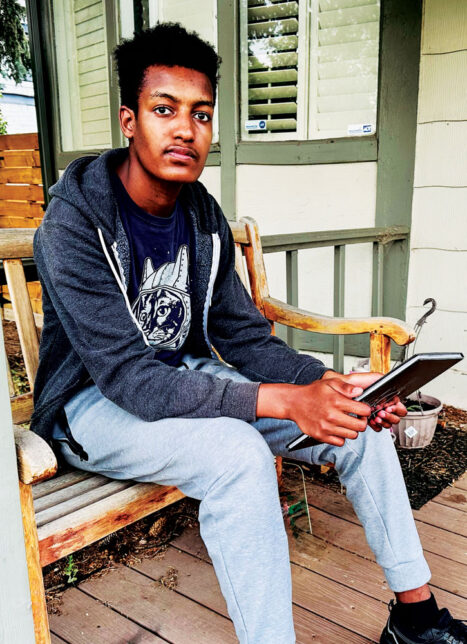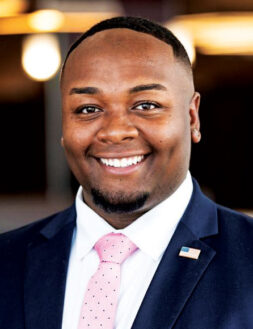
Sedik Mote benefited from the programs at McAuliffe and is now thriving as a junior in high school. He will graduate from Aurora Central next year. Front Porch photo by Christie Gosch
UPDATE: On Aug. 29, DPS concluded the investigation into the McAuliffe seclusion room and found no evidence of discriminatory practices. Although the DPS investigation found that McAuliffe violated district policies by not placing the supervisors inside the room, the report also determined that McAuliffe did not violate anti-discrimination policies and that Dennis did not consider the race of students when utilizing the room.
As the new school year began, McAuliffe International School continued to face turmoil about the firing of principal Kurt Dennis, the use of a seclusion room in the school, and a vote by the school board to approve Dennis’ termination.
The conflict began in July, when Denver Public School administrators fired Dennis after he publicly criticized a policy requiring schools to conduct daily searches on students who have committed violent offenses. But outrage from Northeast Denver residents compelled DPS to hold an Aug. 1 meeting with the McAuliffe community in which district leaders justified their decision to terminate Dennis by addressing his record as the McAuliffe principal and by criticizing his treatment of minority students. This further infuriated supporters of Dennis, who after the meeting began defending his record and promoting his achievements.
Data demonstrates that the system implemented by Dennis was yielding positive results for the students. McAuliffe scored exceptional marks on the School Performance Framework, the students exceeded expectations in most academic subjects, and Dennis received one of the highest “effective” ratings on his annual principal evaluations. McAuliffe also had more students of color than any other middle school in the district, and the minority students outperformed 88 percent of their peers throughout the state. As a result, McAuliffe is one of only 10 schools in the district to receive a “Distinguished for Equity” rating, and U.S. News ranks McAuliffe as the 3rd best middle school in Denver.
“I am incredibly proud of how hard our staff and students worked to learn and grow every year,” says Dennis. “Together, we created a culture of high expectations and excellence for everyone. We never had a system for tracking students or a separate Gifted and Talented program. All of our students took courses in Honors English and Honors Mathematics regardless of their test scores.”

Denver school board Vice President Auon’tai (Tay) Anderson
After the meeting, Denver school board Vice President Auon’tai (Tay) Anderson received an email from an anonymous staff member alerting him about McAuliffe using a seclusion room. “We found some disturbing stuff, such as locks placed on the windows, the exterior of the door, and exposed vents and pipes in the room,” says Anderson. “Children should never have to be incarcerated at school. They go to school to learn, not to be incarcerated.”
Anderson believes that the seclusion room was disproportionately used to punish minority students. “All students that we know were placed in that room were students of color,” says Anderson, while adding that the district had spoken to three students about the room. “This goes to the notion that African American or Latino men are so aggressive that they need to be caged like animals to get them to calm down, and that’s very troubling.” Anderson also maintains that the use of the room violated a policy of the district. “Board policy clearly states that you can’t leave kids alone in an unattended area, so at least one staff member needs to be in the room with the students.”
This criticism from the district was disruptive for the school. It led to DPS launching an investigation into the seclusion room, interim principal Micah Klaver being placed on administrative leave, and Northfield Principal Amy Bringedahl being appointed as the new interim principal at McAuliffe.
However, supporters contend that the room is being mischaracterized and that it serves a beneficial function. They point out that these rooms are common in other district schools. DPS calls them “monitored seclusion rooms,” and district guidelines permit these spaces. As a result, Dennis supporters emphasize that dozens of schools provide rooms where students who are experiencing violent episodes can calm their minds, alleviate their anger, and then return to class.
“The de-escalation room was used to support two students at McAuliffe,” explains Dennis. “Both students were special education students that had Individualized Education Plans and Behavior Intervention Plans stating that the use of a de-escalation room was an appropriate intervention when their behaviors were not safe for either their classmates or themselves.”
Although DPS claimed it never knew about the room at McAuliffe, email communications and Google Calendar documents obtained by Front Porch verify that the district had been communicating with Dennis about its de-escalation room. “On March 8, we met with seven representatives from DPS in the de-escalation room to make sure the space complied with district expectations,” says Dennis. “There were representatives from the district special education team and construction team present at the meeting. Within a few weeks, the district made improvements to the room, and we were working on a plan to create further enhancements over the summer.”
Dennis also contends that a window on the door enabled staff members to supervise the students. “When a student had to use the de-escalation room, there were always at least two adults observing through the window at all times. Me, a special education teacher, a mental health provider, and the student’s one-on-one paraprofessional were present.”
Jessie Hawthorne is a former McAuliffe parent who was grateful for the impact that McAuliffe and the de-escalation room had on her son, Sedik. She adopted Sedik from Ethiopia in 2011, but he experienced severe struggles throughout elementary school.
“He was unable to sit still and they couldn’t contain him,” says Hawthorne. “He would get frustrated with teachers, kick at them, and run down the hall or outside the door.” Hawthorne was unable to find adequate IEP programs despite trying many elementary schools, including Columbine, Whittier, Cole, Smith, and Bradley.
Fortunately, his circumstances improved in middle school when he began attending McAuliffe International. “All he needed was a special ed paraprofessional, and at McAuliffe that finally came true,” says Hawthorne. “This paraprofessional would help Sedik go to classes, follow his schedule, and get used to being in classrooms with 25 other kids.”
Sedik also benefited from the de-escalation room at McAuliffe. Although the room was in a different location, it was equipped with a punching bag to unleash his frustration, a therapy dog to elevate his mood, and staff members to offer him support. “If he was triggered by a disagreement with another student or an issue with a teacher, he would get upset and need a different environment to calm down,” explains Hawthorne. “He was very responsive to mindfulness techniques, that’s largely what they did, and so Sedik responded well to that room.”
The de-escalation room was a crucial factor in the DPS vote. On Aug. 24, the Denver school board voted to uphold the termination of Dennis by a 6-1 margin, with many board members citing the room as the reason for their decision. Despite this vote, Dennis can still be reinstated at McAuliffe by pursuing legal action in federal court or an appeal process with the school district.




0 Comments